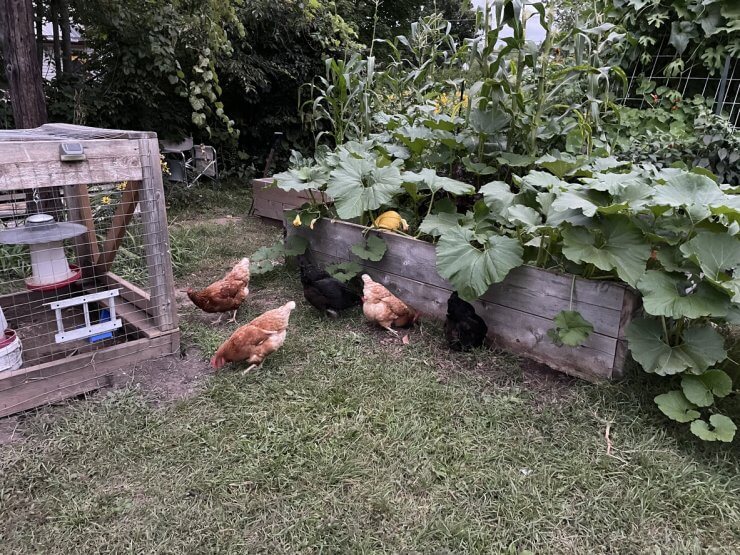
Does the thought of backyard chickens appeal to you? City dwellers interested in country living or those tired of the rising cost of eggs at the grocery store might consider it. However, seeing how quirky and adorable they are, it’s easy to forget to weigh the pros and cons of chickens before bringing them home. Here are a few things to consider when deciding if raising poultry is right for you.
The Pros of Owning Backyard Chickens
Those who raise chickens often tout the many benefits of having them scurry around the yard. You may have even heard them talk about the following advantages.
They Clean up Garden Beds
When it comes to the pros and cons of chickens, few would argue how helpful they are in cleaning up garden beds after a season.
Chickens are expert scratchers, digging in the ground for bugs and seeds. When the growing season ends, they clear the ground of leftover vegetation and mix the soil, improving its nutrient density. They also help reduce the presence of pests and lessen plant diseases.
They Create Compost
Chicken droppings are high in nitrogen, which is essential for soil fertility. You can use their manure and the vegetation they dig up to create the perfect compost for new plants.
Collect the droppings and natural debris and put them in an outdoor compost bin. Composting will take about five to six weeks to decompose and kill pathogens like E. coli and salmonella. For this reason, you should always wear gloves when handling the litter.
The Produce Quality Eggs
Hens start laying eggs at 18-20 weeks old and will continue for about three years. Typically, they’ll lay eggs once or twice within 24 hours if they have enough sunlight exposure. This means you can harvest enough quality eggs for your household or to sell.
Your chickens may stop egg production during the winter due to the cooler weather. However, if you choose to, you can achieve year-round egg laying by putting a heat lamp in their coop.
They Make Great Pets
Chickens are small animals with giant personalities. They’re also intelligent critters with great curiosity and a keen sense of problem-solving.
You won’t have to worry about giving them continuous attention, as they tend to be low maintenance. Nevertheless, owning backyard garden chickens may be an educational opportunity to teach children about food production and pet care.
The Cons of Owning Backyard Chickens
Of all the pros and cons of chickens, it’s important to consider the latter. After reading about the disadvantages, you may realize they’re not right for you.
They’re Costly to Maintain
Owning backyard chickens can be expensive. From the start, you’ll need to pay for the proper permits from your municipality, plus annual renewal fees — and although the cost of a few chicks is relatively inexpensive, it adds up over time.
According to one chicken owner, a coop cost them $315 — however, it could range from $200 to $4,000. Additionally, they spent $1,400 over a year and a half on feed and scratch. Even though the chicken owner sold $1,175 worth of eggs, they still saw a loss of $540.
They’re Noisy
Chickens are chatty and often make soft clicks or purrs. However, they are much louder when spooked, stressed or laying eggs. If they sense danger or a predator nearby, they’ll make high-pitched screeching sounds and flap their wings.
They may be quieter in the evenings, but you must consider whether you want to hear them during the day.
They’re Pooping Machines
Although chicken manure is excellent for soil health, they do poop a lot. One hen creates 70 pounds of manure annually. If you don’t want to step on chicken poop everywhere, you might want to reconsider raising them.
Chicken manure also has a foul ammonia odor, which you may track into your home. It can be unpleasant to next-door neighbors.
They Have a Long Life Span
Chickens live for six to eight years, even though they only lay eggs for a short time. Owners may decide to retire their hens and allow them to live out their days pecking away in the garden or give them to a sanctuary, replacing them with younger ones.
Giving them up may be difficult for those who’ve grown attached to their flock. Likewise, chicken raisers must contend with predation and disease. In this case, euthanasia may be the most humane option.
Backyard Chickens: A Clucking Good Time
If you’ve weighed the pros and cons of chickens in your backyard garden and still want to pursue it, you’re bound to enjoy them. If anything, you’ll have a flourishing garden and get a good chuckle from your hens



